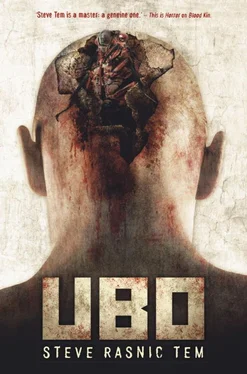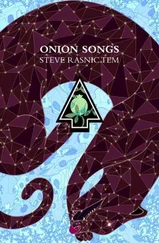Falstaff laughed. “You’d think with all these scientists in charge, the roaches could build a better sewer.” That the roaches were scientists, that they were studying the residents for violent tendencies and dynamics, was their agreed-upon theory. It made perfect sense, given the scenarios they were each forced to act in. Most importantly, it provided a semblance of an answer to the question of why they had all been brought here.
The other men did look uncomfortable, with Lenin glancing at the brown smears on the walls. “That’s just paint, I think,” Daniel said. “These random, foul-looking streaks about, the spots on the floor, I think it’s deliberate. They want us to feel like we’re in a degrading environment. It might even be a separate study all its own.
“Come to think of it, the roaches probably pump in an artificial stink. They want to make things seem as awful as possible—it heightens the scenarios. And maybe they think it’ll bring out our own violent tendencies. A few weeks back I played a guard in the Khmer Rouge. We forced the prisoners to eat our feces, but then we had to smell it on their breath when we tortured them. When theybrought me back here I could still smell it, taste it in the back of my throat. So bad.”
It bothered Daniel that he knew trivia like this, that Stalin had hated kitchen smells, which is why he always kept his living and working quarters far removed from the sources of his meals. Playing the parts of murderers could be quite educational.
“I remember that scenario,” Gandhi interrupted. “I smelled it. I smelled it, too.”
“Exactly,” Daniel said. “The roaches are manufacturing the smell and pumping it in.” It sounded ridiculous even as he said the words, but it was a modestly entertaining theory. Which he didn’t believe. Whatever the source, he was sure this was what Hell smelled like.
“They’re n-not roaches,” Bogart mumbled. “Well, of c—course they’re n—not, but I mean they don’t a—actually resemble roaches, that’s j—just what we all c—call them. They resemble c—cicadas, gigantic cicadas.”
“Ki…ki..what?” Falstaff said.
“C—cicada,” Bogart said. “They make that loud s—song on hot s—summer nights, especially in the South. S—sometimes the locals c—call them locusts, but they’re not t—true locusts.
“Who cares?” Falstaff said.
“Everything m—matters here,” Bogart sounded less and less like Humphrey Bogart the more passionate he became. “Every d—detail has some m—meaning, if we can just f—figure it out. These are relatively b—broad creatures with their w—wide and triangular oversized h—heads. A roach’s h—head would be m—much smaller. And the b—bodies? No c—comparison, the cicada’s being relatively b-bulbous like these, and see the w-way they come to a k—kind of point at the end?”
“Like the ass on a large bee,” Lenin said. Falstaff snorted.
“Yes, b—but again, they’re not really c—cicadas either. The o—ones observing us, the scientists…”
“They look ridiculous in their lab coats.” Gandhi spat. “They don’t even fit.”
“No, they d—don’t. I s—suspect the c—coats are for our benefit, or rather, r—reference. The scientists have those h—huge multifaceted eyes…”
“You can see your face in each one. I hate that! The guards’ eyes are smaller,” Falstaff said, “but they’ve got those huge mouth parts, and swollen forelegs with the serrated edges. I’ve heard they’ve taken off a man’s head with those, two or three, although I’ve never seen it personally. You don’t dare tangle with one of those—you won’t survive it.”
Bogart wrinkled his mouth. “I’ve also h—heard that for p—punishment they can wrap one of those f—forelimb c—claws around your thumb and r—rip it right out of your h—hand, that several c—captives were punished that w—way on their initial t—trip to Ubo. Supposedly there are a n—number of m—men here missing t—thumbs, but I’ve never s—seen one.”
Gandhi waved a thin, fragile-looking hand. “It’s just another story they tell you when you first get here. An old man told me the thumb would grow back eventually so the roaches could torture you all over again. They’re just stories they tell to scare the new arrivals, that’s all.”
Lenin interrupted. “But can we agree to continue to call them roaches? Because that’s the word in our heads, and the other’s too, well, odd.”
The others readily agreed, then fell into silence, waiting. For this was the waiting room. Although the men sometimes referred to it as the commons area, it was really just this big room in the middle of everything where they waited for their next dramatic assignment.
Daniel stood up and walked around. There were few opportunities for exercise here. Although in his next scenario he might be running around creating mayhem, he’d actually be lying on a platform back in the labs, the roaches swarming all over him as if he were an accidentally-dropped morsel of food, taking readings and—he didn’t actually know what all they did, simply that it felt unpleasant afterwards.
The five of them always sat in a circle facing each other in the waiting room. It narrowed their focus, and the grouping provided them with a sense of security. And after six months or more of virtual catatonia following his initial arrival, Daniel had them to thank for leading him out of it.
The room itself was enormous-more than a hundred feet in length, half as wide—and a ruin. It looked to have been a factory originally. Much of the floor space was open, but the concrete and tile floor was pitted every few feet with small impact craters. Daniel remembered photographs of Sarajevo after the siege. The ceiling was missing large sections, with bare wiring and insulation hanging down, some of it melted into ghostly screens of translucent plastic stalactite. Although a great deal of the debris had been swept up, there were still large regions chained off, gaping holes in the floor surrounded by layers of plaster, rotted trim, blast fragments, burnt mechanical parts, and melted masses of the unidentifiable. Whenever residents felt inspired to clean up those areas they were warned away by a rapid deployment of the giant roaches brandishing their serrated and swollen appendages.
Even the so-called clean areas were marred with scorch and rust, dark friction trails, crash scars, and black fields of mold. He’d seen similar footage of abandoned industrial structures in Detroit.
Other groups of residents were scattered around the room, huddled together, backs turned like Daniel’s own group, or occasionally barricaded behind crumbling concrete and steel pillars and overturned furniture. They glanced warily at him and the other groups. Territorial squabbles and accusatory outbursts were common, although during his time here Daniel had never seen any actual combat. The roaches would have quickly intervened, and no one wanted that. Even though he’d been here for a relatively long time (although apparently nothing matching Falstaff’s stint), the visceral reaction he experienced in their presence was debilitating. It made you want to peel off your skin.
The wide archway at one end of the room led to the bunkrooms and cafeteria, and presumably other barracks and other populations of residents beyond. It was rumored there was a small section for women only, but Daniel had his doubts. He certainly hadn’t seen any women since he’d been here. Falstaff’s explanation had been simple, “Women don’t kill nearly as many people, so the roaches aren’t as interested.” The vast majority of the residents were men in their late twenties, with a few middle-aged, and a select few much older. Two or three appeared to be in their late teens, with no one under eighteen as far as he could tell.
Читать дальше












